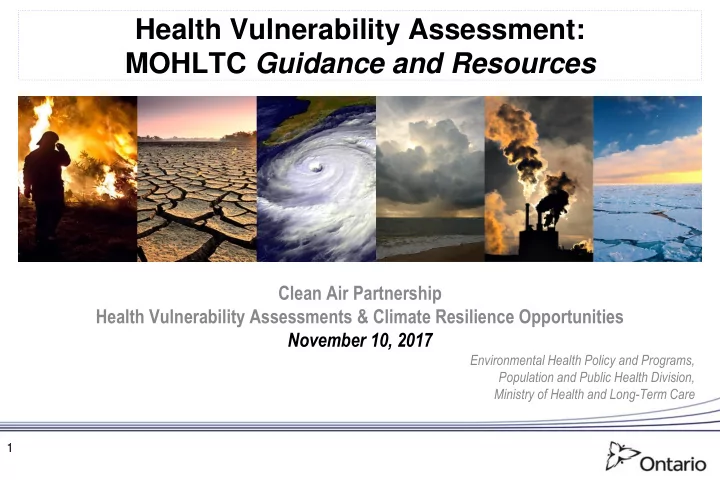

Health Vulnerability Assessment: MOHLTC Guidance and Resources Clean Air Partnership Health Vulnerability Assessments & Climate Resilience Opportunities November 10, 2017 Environmental Health Policy and Programs, Population and Public Health Division, Ministry of Health and Long-Term Care 1
Purpose To provide an overview of the provincial guidance, resources and tools that could be used to facilitate Vulnerability Assessments Outline : Ontario’s Public Health System • Modernization of Ontario Public Health Standards • Healthy Environments and Climate Change Guideline • Standardized Approaches and Tools • Ontario Climate Change and Health Toolkit • Training Plan for the Public Health Sector • 2
Ontario’s Public Health System • Ministry of Health and 36 Public Health Units Long-Term Care • Other Ministries • Ministry of Labour • Ontario Ministry of Agriculture, Food and Rural Affairs • Ministry of the Environment and Climate Change • Federal Partners • Health Canada • Public Health Agency of Canada 444 Municipalities • Environment and Climate Change Canada • Public Health Ontario • Public Health Associations 3
Ontario Public Health Standards Modernization: Healthy Environments Standard The new Healthy Environments Standard will promote population-based activities to minimize the effects of climate change and promote healthy natural and built environments . The development of the Healthy Training of public health units Environments and Climate Change in developing strategies using the Guideline will enable public health Ontario Climate Change and units to work with provincial Health Toolkit will be facilitated by ministries and local partners to the MOHLTC in partnership with assess risks, including climate Health Canada, Environment change, within their own Canada and Climate Change, communities and develop MOECC and Public Health Ontario mitigating strategies 4
Healthy Environments and Climate Change Guideline Proposed requirements include submission for a • plan on Vulnerability Assessments and how the vulnerabilities would be addressed, with annual progress reports. The guideline strengthens population based • activities to proactively address the impacts of emerging environmental health issues, including the impacts of climate change. For example, raising awareness about exposure to radon, ultraviolet radiation, PM2.5, etc. The guideline sets the stage for advancing existing • healthy built and natural environments initiatives to support standard provincial approaches. For example, linkages with the Chronic Diseases Standard to identify co-benefits, explore linkages with Ontario’s planning framework. 5
Standardized Approaches & Tools The MOHLTC has collaborated with provincial, federal agencies and partners to introduce population-based approaches and tools to address the emerging effects of climate change on the public health system: Ontario Climate Change and Health Air Quality Health Toolkit July 2016 Index (AQHI) (Training of PHUs April 2015 in development) Harmonized Heat Warning NEW-Standardized and Information System Cold Alerting System. (HWIS) In development July 2016 ETD Summer 2018 6
Ontario Climate Change and Health Toolkit • Public Health Units are currently engaged in a variety of climate change activities including research , policy development , and health promotion, as reported in a survey conducted in 2016 by the Ontario Public Health Association (OPHA). • 38 % were found to have conducted Vulnerability Assessments • Ontario Climate Change and Health Toolkit (July 2016) was developed to assist public health units in raising awareness about the potential public health impacts of climate change and to support the broader Ontario Climate Change Strategy and Action Plan. The toolkit is comprised of: 1. Ontario Climate Change and Health Vulnerability and Adaptation Assessment Guidelines 2. Adaptation and Assessment Workbook 3. Ontario Climate Change and Health Modelling Study 7
Training Plan for the Public Health Sector Training Outcomes Gain understanding of the Identify and engage associations between leaders from PHUs weather/climate and health who have Offer a continuum outcomes. experience in of introductory and advancing climate skills based Identify opportunities to incorporate change actions in webinars to develop their communities, climate change concerns into existing skills and capacity. particularly those policies and programs. that have developed vulnerability plans. Assess vulnerability and plan/prepare for adaptation. Engage leading Collaborate across sectors to Evaluate the experts in training offerings promote activities that improve supporting the and develop a plan training initiative population health in a changing for future ongoing (Health Canada, needs, in climate. Environment collaboration with Canada and Climate other partners. Create Baseline Analysis for Change Canada, MOECC and PHO). monitoring of future changes and risks. 8
Questions & Comments Noor Shahid Environmental Health Policy and Programs Population and Public Health Division Ministry of Health and Long-Term Care 393 University Avenue, 21st Floor Toronto ON M7A 2S1 Tel: (416) 326-3114 Noor.Shahid@Ontario.ca 9
Recommend
More recommend